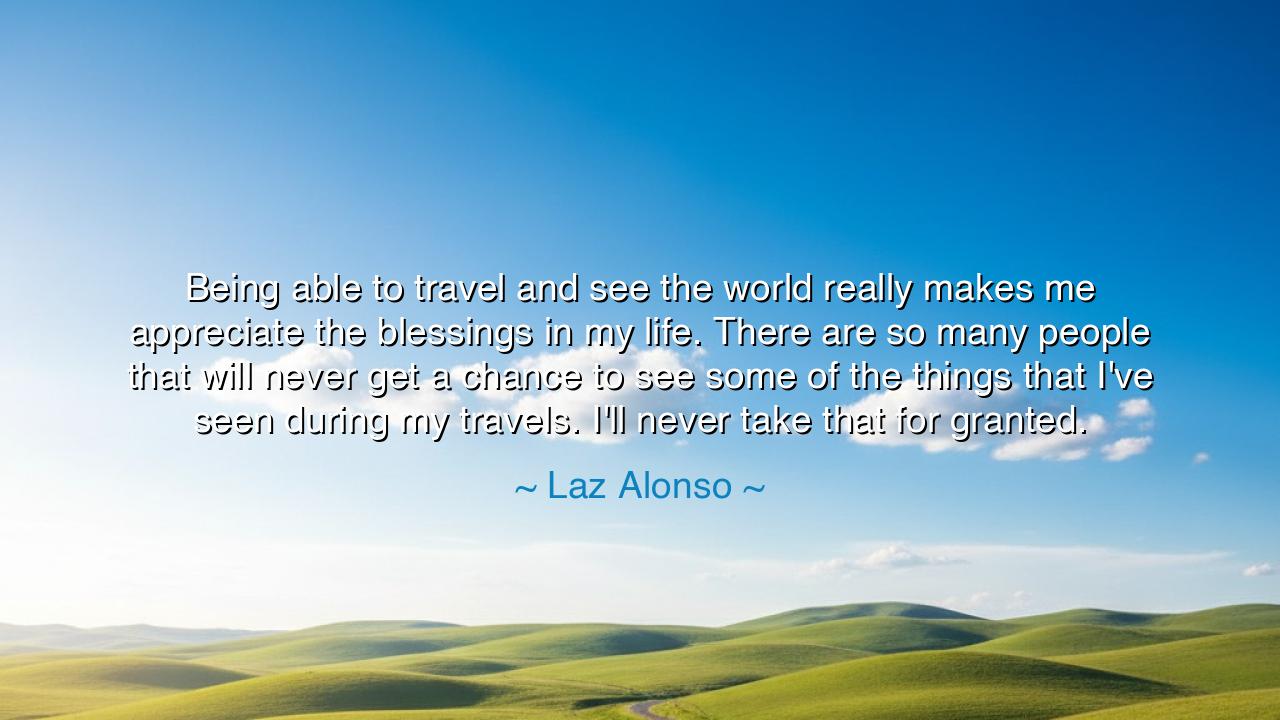
Being able to travel and see the world really makes me
Being able to travel and see the world really makes me appreciate the blessings in my life. There are so many people that will never get a chance to see some of the things that I've seen during my travels. I'll never take that for granted.






The words of Laz Alonso flow with humility and deep awareness of life’s fleeting gifts: “Being able to travel and see the world really makes me appreciate the blessings in my life. There are so many people that will never get a chance to see some of the things that I’ve seen during my travels. I’ll never take that for granted.” Though spoken simply, these words carry the weight of eternal truth—that to see beyond one’s own doorstep is to awaken to gratitude, and that gratitude itself is the richest treasure of all.
In the ancient world, travel was not easy nor common. Only the merchant, the pilgrim, or the conqueror crossed the seas and deserts. For the vast majority, life was bound to a single village, a single horizon. To return from distant lands was to return with stories so wondrous they seemed like myth. What Alonso calls blessings were once seen as miracles: to walk where others could not, to behold sights beyond the imagination, to experience cultures and wonders denied to most. Even now, in our age of airplanes and highways, this truth remains—for countless souls will live and die without ever glimpsing the vastness of the earth.
Consider the story of Ibn Battuta, the great Moroccan traveler of the 14th century. He journeyed more than 70,000 miles, across Africa, Asia, and beyond, seeing kingdoms and cultures few men of his time could even dream of. And yet, in his writings, he did not boast as a conqueror but marveled as a witness, humbled by the diversity of humanity and the immensity of creation. Like Alonso, he recognized that such experiences were not to be taken for granted, but cherished as sacred gifts entrusted to him.
The meaning of the quote lies in the union of two virtues: wonder and gratitude. To see the world is to expand the soul, to realize how vast life truly is and how small one’s own place within it. But to let those experiences deepen into appreciation is the greater wisdom. Many may travel and still remain blind, chasing novelty without learning humility. Alonso’s vow never to take his experiences for granted reveals the higher path: that the true reward of travel is not the memory of sights, but the growth of a thankful spirit.
For there is also compassion in his reflection. He does not boast of what he has seen, but remembers those who cannot see what he has seen. His joy is tempered by awareness of inequality, of the countless who will never travel, who will never gaze upon distant horizons. This awareness transforms privilege into responsibility—it reminds us to share our stories, to inspire others, and to use the blessings we have been given not as possessions but as tools to uplift.
The lesson for us is profound: do not waste your blessings in forgetfulness. If life grants you the chance to travel, to see beyond your corner of the earth, hold those memories with reverence. Let them awaken gratitude, not pride. Let them remind you of the millions who cannot do the same, and let that remembrance make you more compassionate, more generous, more alive. If you cannot journey far, then seek the wonder in what you do have, and cherish it fully. Gratitude turns even the smallest horizon into a vast and holy world.
Thus, let this truth be passed on: the measure of life is not in how far you have traveled, but in how deeply you have appreciated the blessings along the way. To take nothing for granted is to live richly, even in simplicity. To see the world is a gift—but to be transformed by it into one who is thankful, humble, and compassionate is the greater gift still.






AAdministratorAdministrator
Welcome, honored guests. Please leave a comment, we will respond soon